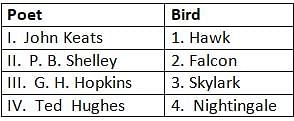APSET Paper 2 Mock Test - 2 (English) - AP TET MCQ
30 Questions MCQ Test APSET Mock Test Series 2025 - APSET Paper 2 Mock Test - 2 (English)
A stanza of eight pentameter on the pattern of ab, ab, ab, cc is known as :
Which novel by Margaret Atwood explores the themes of memory, trauma, and the unreliable nature of history through the lens of a dystopian society?
| 1 Crore+ students have signed up on EduRev. Have you? Download the App |
The author of the Archetypal Patterns in Poetry is
What does the phrase "brutish necessity" in Walcott's "A Far Cry from Africa" suggest about the nature of conflict?
In the mechanical drill method of second language acquisition:
(a) The learner has the freedom to choose from many responses.
(b) The learner’s response is totally controlled.
(c) Comprehension of the item by the learner is not required.
(d) Comprehension of the item by the learner is obligatory.
The right combination according to the code is:
Blow, blow, thou winter wind, / Thou art not so unkind / As mans ingratitude; These lines are from :
Find the chronological order in which the following major movements in English literature came into being:
A. Renaissance
B. Neoclassicism
C. Romanticism
D. Victorianism
E. Modernism
Choose the correct answer from the options given below:
Who among the following are major writers belonging to the confessional poetry movement of the 1960s?
(i) Sylvia Plath
(ii) Robert Lowell
(iii) Anne Sexton
(iv) W. H. Auden
The right combination according to the code is:
Who among the following propose that the unconscious comes into being only in language?
Match the characters with the plays in which they feature:

" Fourth World Literature " refers to :
- the works of native people living in a land that has been taken over by non - natives.
- the works of black people in the United States.
- the literature of the marginalized.
- refers to the works of non-heterosexuals. Of the above :
Find the chronological order of publication of Chaucer's major works:
A. The Canterbury Tales
B. Troilus and Criseyde
C. The Book of the Duchess
D. The Parliament of Fowls
Choose the correct answer from the options given below:
In which play does G.B. Shaw explore the conflict between idealism and realism through the story of a young woman who is torn between her love for a revolutionary and her desire for a conventional life?
Which play by G.B. Shaw features a character named Undershaft, a wealthy arms manufacturer who believes that war is a necessary evil?
Luigi Pirandello’s Six Characters in Search of an Authordeliberately blurs the boarder lines between the world of the theatre and the world of ‘real life’ by carefully chiselled dialogues like: “Don’t you feel the ground beneath your feet as you reflect that this ‘you’ which you feel today, all this present reality of yours, is destined to seem a mere illusion to you tomorrow? ” Who is the speaker? Who is it addressed to?
In "A Doll's House", what event forces Nora to confront the reality of her situation and make a life-altering decision?
|
60 tests
|


















